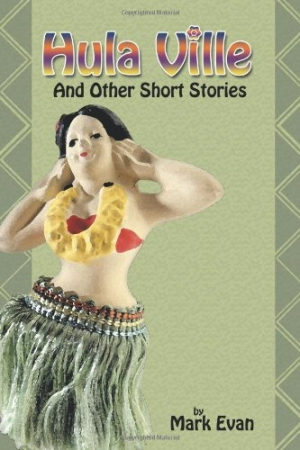Hula Ville
And Other Short Stories
“It is our worst and most embarrassing moments that end up defining us as human beings,” comments author Mark Evan in “Cut,” one of the nearly forty short stories in his book, Hula Ville. An astute observer of the oddities of human behavior, he populates his stories with quirky characters who think, say, and do embarrassing things over the course of their lives, albeit often not the least bit embarrassed by them. Evan conveys a sense of his own self-conscious discomfort, however, and readers, too, may find themselves wondering just what some of these characters were thinking.
Evan’s fascination of the human condition and the minutiae of daily life is clear and evident. Each of his stories reveals a careful scrutiny of human behavior, from the acceptably “normal” to the purely bizarre, much of it difficult for even the characters themselves to explain.
The people in his stories are a diverse crew. All Southern Californians, they differ from one tale to the next, ranging from teens to the elderly, male and female. Whether describing one specific character’s own “private hell” or relating another’s peculiar anxieties, Evan examines the vagaries of human existence.
Desperation, dissatisfaction, and eccentricities abound, always with a “what if?” unasked in the background. “Would have, should have, could have” situations present themselves at every turn, and his characters rarely have a firm grasp on the difference between success and failure. Some are outrageously funny in their foibles, others pathetic, but all reveal themselves to be “as flagrantly human as human can be,” however surreal their circumstances.
Evan writes well, and his tales often resemble character studies as much as short stories. Readers will easily recognize many of his characters, possibly as eccentric friends or family members. Certain themes carry through stories, particularly the unstoppable passage of time, the overwhelming burden of responsibility, and the weight of regret.
Dreams and goals, and the relationship of one to the other—frequently a case of recognizing the “right place and time”—figure prominently, and the characters often fail miserably, albeit in familiar, all too human ways. Readers will want to slap or vehemently shake a few of them and compassionately hug some of the others—these characters all will elicit some sort of reaction.
A few details are a bit off, like the song “Hey Jude” playing in 1967 (the Beatles song was released in 1968), or the year and a half that a character spends in a nine-month program. However, overall, Evan admirably captures the essence of the times and the people about whom he writes. Another quick edit would rid the text of dropped words and minor grammatical errors.
Evan offers an unusually discerning and philosophical view of people and their idiosyncrasies in Hula Ville, a collection of perceptive stories that capture the very fine line between “normal” and odd. This is a book about human behavior, above all else, and it is as delightfully unconventional as the people who inhabit its pages.
Reviewed by
Cheryl Hibbard
Disclosure: This article is not an endorsement, but a review. The publisher of this book provided free copies of the book and paid a small fee to have their book reviewed by a professional reviewer. Foreword Reviews and Clarion Reviews make no guarantee that the publisher will receive a positive review. Foreword Magazine, Inc. is disclosing this in accordance with the Federal Trade Commission’s 16 CFR, Part 255.

